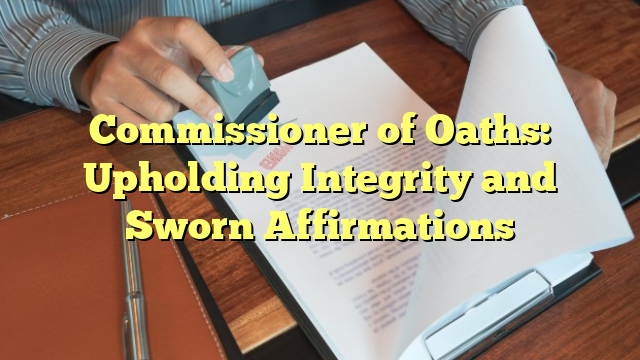In legal systems around the world, the role of a commissioner of oaths holds great importance in validating sworn statements and affirmations. Commissioners of oaths play a vital role in ensuring the authenticity and integrity of legal documents, oaths, and affidavits. This article aims to provide an in-depth exploration of the role of commissioners of oaths, their responsibilities, the significance of their role in legal proceedings, and the impact they have on upholding justice and truth. Notary Mobile App
-
Understanding the Role of a Commissioner of Oaths:
A commissioner of oaths is an individual authorized by law to administer and witness the swearing or affirmation of oaths or solemn declarations. This section provides an overview of the commissioner of oaths role, explaining their legal authority, responsibilities, and the ethical standards they must adhere to. It also highlights the distinction between a commissioner of oaths and a notary public, as the two roles are often confused.
-
Legal Framework and Authority of Commissioners of Oaths:
Commissioners of oaths derive their authority from specific legal frameworks within each jurisdiction. This section explores the legislative basis for the appointment and regulation of commissioners of oaths in various countries, highlighting the statutes, acts, or regulations that confer their authority. It also discusses the limitations and scope of their powers in witnessing and certifying oaths and affirmations.
-
Functions and Duties of Commissioners of Oaths:
The article delves into the functions and duties entrusted to commissioners of oaths. It examines the different types of documents and declarations that commissioners of oaths can witness, such as affidavits, statutory declarations, and oaths of allegiance. Additionally, it explores the importance of accurately recording and maintaining records of sworn statements for future reference and legal validity.
-
Role of Commissioners of Oaths in Legal Proceedings:
Commissioners of oaths play a crucial role in legal proceedings, acting as impartial and trusted individuals who verify the truthfulness and authenticity of sworn statements. This section discusses their involvement in courtrooms, administrative tribunals, and other legal settings. It highlights how commissioners of oaths contribute to the administration of justice by ensuring that witnesses and deponents understand the seriousness of their statements and affirmations.
-
Commissioners of Oaths and Affidavits:
Affidavits are legal documents that require the solemn affirmation or oath of the deponent, certifying the truthfulness of the statement made. This section focuses on the specific role of commissioners of oaths in witnessing and certifying affidavits. It explores the requirements for a valid affidavit, the importance of impartiality, and the process followed by commissioners of oaths in administering oaths and affirmations.
-
International Recognition and Cross-Border Validity:
Given the global nature of legal transactions, the article examines the recognition and validity of oaths and affirmations witnessed by commissioners of oaths across jurisdictions. It discusses the principles of reciprocity, comity, and mutual recognition, as well as the steps involved in ensuring the cross-border acceptance of sworn statements. It also explores the role of international treaties and conventions in facilitating such recognition.
-
Professionalism, Ethics, and Accountability:
Commissioners of oaths are entrusted with upholding the highest standards of professionalism, ethics, and accountability. This section explores the ethical responsibilities they bear, including maintaining confidentiality, avoiding conflicts of interest, and ensuring the accuracy of sworn statements. It also discusses the mechanisms in place to address complaints and disciplinary actions against commissioners of oaths who breach their ethical obligations.
-
Future Trends and Technological Advancements:
In an era of technological advancements, the role of commissioners of oaths is not immune to change. This section discusses the potential impact of emerging technologies, such as remote online commissioning and digital signatures, on the practice of commissioners of oaths. It explores the benefits and challenges associated with these advancements and the need to balance innovation with maintaining the integrity of sworn statements.
Conclusion:
Commissioners of oaths hold a critical position in the legal landscape, ensuring the authenticity and veracity of sworn statements and affirmations. Their role in upholding justice and truth is indispensable in legal proceedings and administrative processes.
By maintaining the highest standards of professionalism, ethics, and accountability, commissioners of oaths contribute to the trust and confidence placed in legal systems worldwide. As we embrace technological advancements and navigate the complexities of a globalized society, commissioners of oaths will continue to play a pivotal role in certifying the truth and upholding the rule of law.
